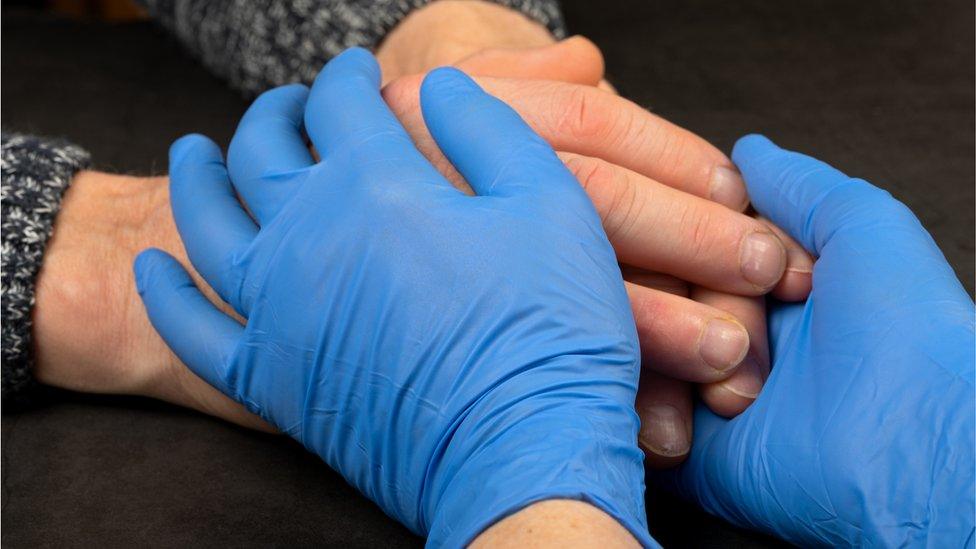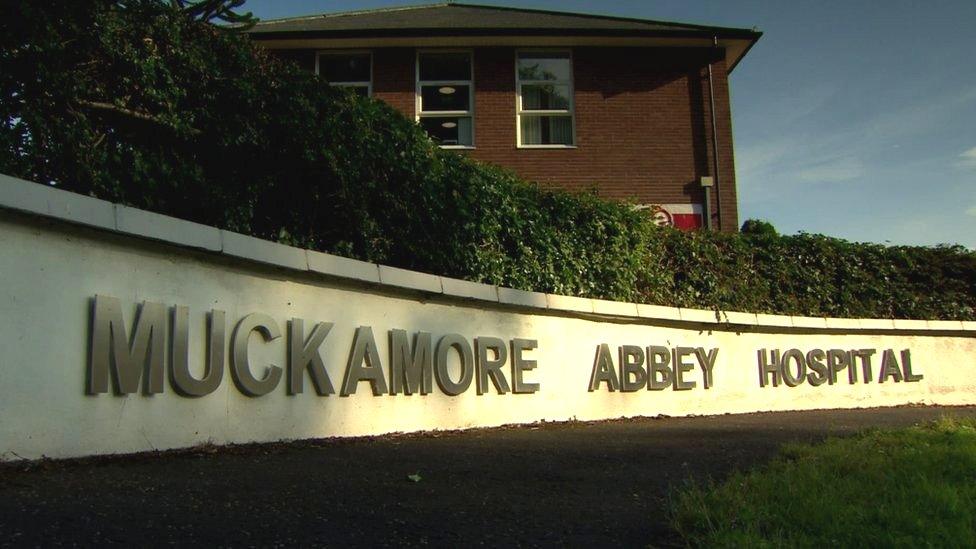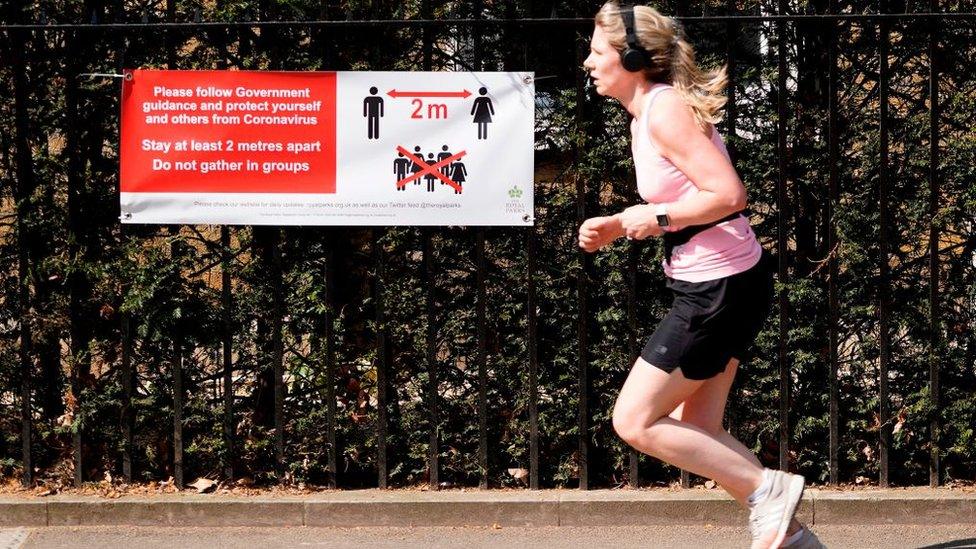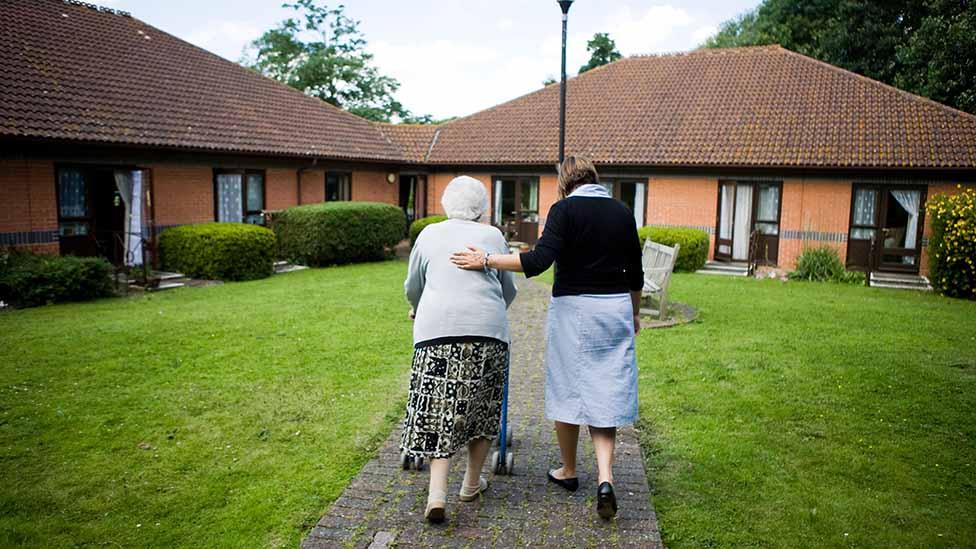Coronavirus: 14 Covid-19-related deaths at Killyleagh care home
- Published

Fourteen staff members at the home have also tested positive for coronavirus
Fourteen people in one care home in County Down have died after being diagnosed with Covid-19, figures obtained by the BBC have shown.
In all, 39 residents at Ringdufferin Nursing Home in Killyleagh have been confirmed to have the virus.
The nursing home said that "from the outset" of the pandemic, it had put measures in place to protect residents and staff from the virus.
Some 40% of coronavirus-related deaths in NI have been linked to care homes.
A further four coronavirus-related deaths in Northern Ireland were recorded by the health department on Thursday, bringing its total death toll, mostly comprising hospital fatalities, to 422.
Northern Ireland's overall figure will be higher when all deaths in the community are recorded: Separate figures from statistics agency Nisra show there had been 393 Covid-19 related deaths by 24 April.
A fifth of homes affected
The home's management offered its "deepest sympathy" to families and friends of those who had died.
It said the positive cases were confirmed over several weeks, and that staff had followed the Covid-19 guidelines from health trust, the Public Health Agency and the care home regulator - the Regulation and Quality Improvement Authority (RQIA).
"All admissions received into the home were before any suspected or confirmed cases of Covid-19 were identified," said a statement from the home.


Staff had put in place social distancing, additional cleaning and the use provision of personal protective equipment (PPE) "well ahead of any patients demonstrating symptoms of the virus", added the statement.
Ringdufferin Nursing Home also said it had been "proactive" on testing, inviting health trust staff into the home several weeks ago to undertake testing when some residents developed symptoms.
Any staff member who showed symptoms was sent for testing, it added, although testing of asymptomatic staff had only become available more recently.
It insisted guidelines on isolation of suspected cases were "stringently applied within the home".
More recently, all staff have been offered tests and 14 staff members at the home have tested positive.
The Commissioner for Older People in Northern Ireland said this week Covid-19 testing for everyone living and working in Northern Ireland's 484 care homes should be the top health priority.
'A miracle' mum's alive
Michael Carville's 72-year-old mother is among the 39 residents in Ringdufferin Nursing Home to have tested positive for Covid-19.
He said it was a "miracle" she was still alive - something he attributed to the care she had received from its staff.
"I don't feel it is the care home's fault that it is in that situation," said Mr Carville.
"Other organisations should have been much quicker to the task of protecting the very vulnerable people in care homes."

'More transparency needed'
By Marie-Louise Connolly, BBC News NI health correspondent
Accessing information about the spread of Covid-19 in Northern Ireland's care homes has been very difficult.
The public wants to know what is happening, especially with older and more vulnerable people, but the various health agencies have been providing few verified facts.
Care home owners say they need to manage information about cases and deaths in a controlled, sensitive manner.
While this is understandable, it means the information tends to emerge first from concerned staff or families.
There are arguments about whether the health department should publish data on individual care homes. But there have also been calls for more transparency about the spread of the virus, so that reports on it are as timely and accurate as possible.
Concerned families want - and deserve - to know about their loved ones living and working in these homes; there is no more important time for openness and clarity than during a pandemic.

Mr Carville's mother has advanced dementia and he said Ringdufferin was a "vulnerable environment dealing with dementia patients and end-of-life care".
"These are very vulnerable people who should have been protected better by the government", he said.
"The staff in Ringdufferin have done everything in their power to protect their residents. I couldn't be happier with how they have looked after my own mum."
More than a fifth of Northern Ireland's care homes - 110 - are now caring for vulnerable older people with coronavirus or flu-like symptoms, which are logged each day in care homes' forms about virus activity, the BBC understands.
The homes have a total of 16,000 beds, not all of which are occupied.
The health department said it needed to be sure of the quality of the daily information from care homes before releasing more detailed information.
"While good progress has been made, work is still required to validate the data and ensure its consistency," said the department.
"Once work on this data set is complete, we believe it will provide us with more complete information on the position in our homes than any other part of the UK or Ireland."
Movement between wards
Meanwhile, BBC News NI has also confirmed that 27 staff at Muckamore Abbey Hospital in Antrim have tested positive for Covid-19 and a further 26 patients have been tested for the virus.
The Belfast Health Trust said that under data protection regulations it could not confirm how many of the 26 patients who were tested were found to have the virus, but none has died as a result of disease.

Muckamore cares for adults with severe learning disabilities and mental health needs
At the Stormont Health Committee on Thursday, Sinn Féin MLA Pat Sheehan asked the Public Health Agency for its response to concerns expressed to him that staff at the hospital may be moving between wards.
The Director of Public Health Prof Hugo van Woerden said that would be high-risk, expressing concern at the prospect of staff moving between different wards.
"Every effort should be made to keep staff linked to the same set of patients, so that if some spread does happen in a group of patients or staff, that, that is ring-fenced as much as possible," he said.
- Published6 May 2020

- Published24 April 2020

- Published15 May 2020
